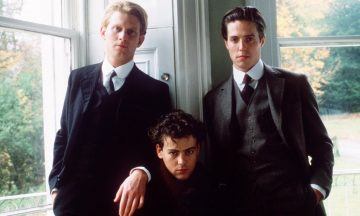Colm Toibin in The Guardian:
 In the summer of 1892 the poet John Addington Symonds took his lover, a Venetian gondolier called Angelo Fusato, on a tour of Britain, including visits to country houses where Fusato posed as Symonds’s manservant. Symonds’s wife Catherine and his daughter were living safely in Davos at the time. After his first meeting with Fusato, Symonds wrote: “He was tall and wiry, but very slender … he was rarely in repose but moved with singular brusque grace … Great fiery eyes, gazing intensely, with compulsive effluence of electricity … He fixed and fascinated me.” Love, however, did not transform itself automatically into art. Symonds wrote a bad sonnet in Fusato’s honour. (“Till, mother-naked, white as lilies, laid / There on the counterpane, he bade me use / Even as I willed, his body.”) When Symonds died in 1893, Fusato went to work for the writer Constance Fenimore Woolson in Venice. After her suicide the following year, he became Henry James’s gondolier, as James, who had been a close friend of Woolson’s, sought to deal with her papers. While it is not clear if Woolson knew about Fusato and Symonds, James certainly did. He was fascinated by Symonds’s efforts to grapple with his homosexuality and was, in 1896, one of the early readers of Symonds’s privately printed pamphlet A Problem in Modern Ethics.
In the summer of 1892 the poet John Addington Symonds took his lover, a Venetian gondolier called Angelo Fusato, on a tour of Britain, including visits to country houses where Fusato posed as Symonds’s manservant. Symonds’s wife Catherine and his daughter were living safely in Davos at the time. After his first meeting with Fusato, Symonds wrote: “He was tall and wiry, but very slender … he was rarely in repose but moved with singular brusque grace … Great fiery eyes, gazing intensely, with compulsive effluence of electricity … He fixed and fascinated me.” Love, however, did not transform itself automatically into art. Symonds wrote a bad sonnet in Fusato’s honour. (“Till, mother-naked, white as lilies, laid / There on the counterpane, he bade me use / Even as I willed, his body.”) When Symonds died in 1893, Fusato went to work for the writer Constance Fenimore Woolson in Venice. After her suicide the following year, he became Henry James’s gondolier, as James, who had been a close friend of Woolson’s, sought to deal with her papers. While it is not clear if Woolson knew about Fusato and Symonds, James certainly did. He was fascinated by Symonds’s efforts to grapple with his homosexuality and was, in 1896, one of the early readers of Symonds’s privately printed pamphlet A Problem in Modern Ethics.
…Naomi Wolf’s Outrages establishes the context for Symonds’s desperate efforts to justify his own sexual feelings. Since he was born in 1840, he was 15 when the first edition of Walt Whitman’s Leaves of Grass appeared, the same year that legislation in Britain streamlined the laws against sodomy and ensured that men found guilty of it served long prison sentences. With intelligence and flair, Wolf uses the various responses to Whitman to show the levels of intense need in the decades after the publication of Leaves of Grass for images and books that would rescue homosexuality from increasing public disapproval.
More here.
